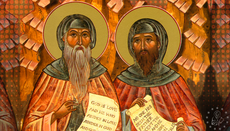Must Christians Bless the Modern State of Israel?

There is no authentic Christian teaching to support the modern State of Israel, nor any Christian mandate to bless it. On the contrary: the modern State of Israel is quite anti-Christian. Evangelicals, through their support for Israel, have also supported the destruction of Christianity in the region. Christian supporters of Zionist Israel will have much to answer for on Judgment Day.
His disciples came to him and showed him the buildings of the temple. But Jesus told them, “You see all of these things, do you not? Amen, I tell you that not one stone will be left standing on another; all will be thrown down.” (Matt. 24: 1-2)
After years of Jewish resistance to the Roman imperial rule, Jerusalem fell on September 8, in A.D. 70, after a prolonged and terribly bloody siege.
The once grand Herod’s Temple, glistening with white marble, was completely burned to the ground. All the buildings of the Temple Mount lay in ruin.
The complete destruction of the Temple in Jerusalem was an unspeakable catastrophe for the Jews. The very center of Old Testament worship was removed from the face of the earth. The Roman authorities forbade the rebuilding of the temple and abolished the Sanhedrin.
The year 70 marks the end of the ancient Mosaic covenant and Temple worship and the beginning of Rabbinical Judaism. Numerous Jews had also begun to follow Jesus of Nazareth, confessing Him to be the Messiah. These became known as Christians, and they understood the Messianic prophecies of the Old Testament to be not only for ethnic Israel but for all of humanity. Rabbinical Judaism was narrow in its application, confined almost strictly to the Jewish people.
Christianity applied a cosmic view to the coming of the Messiah, professing that He had come to redeem all of humanity. Christianity professed that it was through confession, faith, and following of Jesus Christ that one becomes a true Israelite—that is, of the people of God. The Christian Church understood herself to be the continuation of true Israel.
The Bar Kochba revolt (A.D. 132-136) solidified the exile of the Jewish people from the land of Israel. The revolt is named after its leader, Simon Bar Kochba, “son of a star.” The Roman response to what is called the “third Jewish revolt” was definitive and brutal. The primary participants of this revolt were the Jews who rejected Jesus as the Messiah and followed some form of Rabbinical Judaism. Simon Bar Kochba claimed a sort of messianic status.
The Roman Emperor Hadrian showed no mercy to the rebels. Some sources claim there were so many corpses that one could have used them to build a wall several miles long. After this revolt, all Jews were forbidden to live within the city of Jerusalem or within sight of it. The city itself was renamed Aelia Capitolina. Some historical evidence suggests that a temple to Jupiter was built on the site Herod’s Temple.
The Bar Kochba revolt marks the total dispersal of the Jewish people from the land of Israel. The land became inhabited primarily by non-Jewish peoples.
Just over 1,800 years after the Bar Kochba revolt, in A.D. 1948, the modern state of Israel was established. The indisputable and foundational ideology for this new state is “Zionism.” Before a brief survey of this ideology is presented, I will examine the New Testament view of Israel, the people of God. The driving question of this article is, Does the New Testament require Christians to bless and support the modern state of Israel? Is there a Scriptural mandate to serve the modern State of Israel?
Most Christian sources during the historical period described above concerning the destruction of the Temple and the exile of the Jews from the land around Jerusalem, state that the unbelieving Jews were no longer truly Israel. The brutal historical events were viewed as the fruit of the unbelieving Jews rejecting their Messiah, Jesus. The early Christians viewed Rabbinical Judaism as a complete departure from the Mosaic revelation and thus a total innovation. They viewed the Christian Church as the authentic continuation of Israel, the community of the Lord.
In Galatians 6:16, St. Paul writes, To those who live by this rule, may there be peace and mercy on them and on the Israel of God. The ancient Christian commentaries on this verse understand it to refer to the Church, to those who have faith in Jesus Christ. In his commentary on Galatians, St. John Chrysostom, summarizing that Christian consensus, says:
For those who pursue these things [the Gospel, my note] shall enjoy peace and philanthropy, and may be properly called by the name of "Israel." Those who are contrary minded, though they be descendants from him (Israel) and have a common name, yet have they fallen away from these things, both the relationship and the name.
This harmonizes with the New Testament witness. St. Paul proclaims that, in Christ, There is neither Jew nor Greek... If you are Christ’s, then you are Abraham’s seed and heirs according to the promise (Gal. 3:28-29). The Old Testament promises are fulfilled in Christ, and those who have faith in Him are authentic heirs. He teaches elsewhere: However, to those who are called, both Jews and Greeks, Christ is the power of God and the wisdom of God (1 Cor. 2:24).
In the same Epistle, Paul writes again, For in one Spirit we were all baptized into one body, both Jews and Greeks, slaves or free; we were all made to drink into one Spirit (1 Cor. 12:13). In Romans, he proclaims: There is no difference between the Jew and the Greek, for the same Lord over all is rich unto all who call upon Him Rom. 10:12). In the Epistle to the Colossians he writes again, Here there cannot be Greek and Jew, circumcision and uncircumcision, barbarian, Scythian, slave or free; but Christ is all and all (Col. 3:11).
Jesus Christ is the way of entry into the true Israel, the people of God. The former ethnic standards of being a member of Israel are removed. Circumcision itself is also removed, being a symbol of Baptism. Christ Jesus is the source of the fullness of communion and covenant with the Living God.
The New Testament teaches that the cause of blessing is faith in Jesus Christ. Being an ethnic Jew is not a source of automatic blessing. St. John the Baptist perceived this reality when he proclaimed to the Pharisees and Sadducees, You offspring of vipers, who warned you to flee the coming wrath? Therefore, bring forth fruit worthy of repentance! Do not think to yourselves “We have Abraham as our father!” Truly, I say to you that from these stones God is able to raise up children to Abraham (Matt. 3:7-9). This is, in part, a prophetic statement that from the “stones” of the Gentiles God will raise up His children. Being an ethnic Jew is not a guarantee of receiving blessings. Following the way of the Lord is.
The Lord Jesus established blessing His name as a requirement. Indeed, Jesus Christ is the one true Israel. Jerusalem, Jerusalem, who kills the prophets and stones those who are sent to her! How often I have desired to gather your children, just as a hen gathers her brood under her wings; but you were not willing! Behold, your house is left to you a desolate state. For I tell you, you will not see me from now on until the day when you say, ‘Blessed is He who comes in the Name of the Lord! (Matt. 23:37-39). The New Testament requires that all Christians “bless the Name of the Lord.”
The Christian understanding is that, since Jesus is the Messiah, He had the authority to remove the unbelieving Jews from the blessing of Israel. Indeed, He simply confirmed their own actions. In their willing refusal of their Messiah, they removed themselves from the people of God, Israel. Thus, the unbelieving Jews are left desolate and without the blessing of Israel until they confess Jesus Christ as Lord. This is what the Lord Himself has laid down.
There is not a single New Testament verse instructing Christians to bless the unbelieving Jews as the nation of Israel. In the economy of God, the Gospel was first preached to the Jews. This was fitting because they were called to be the custodians of the Old Testament revelation of God. In Romans, Paul writes that many Jews (including himself) received their Messiah. He uses the analogy of branches being removed to illustrate the action of rejecting the Messiah by unbelieving Jews. He also speaks with hope that all his people will confess their Messiah.
Paul warns the Gentile believers not to gloat over the unbelieving Jews who removed themselves from the tree of Israel because, through unbelief, the same thing could happen to them. He admonishes all believers to continue steadfast in Christ Jesus, who is the source of Israel. The reader may refer to Romans 11 for Paul’s full discourse on this matter. It is the most extensive section in the New Testament that addresses the state of those Jews who rejected their Messiah.
Elsewhere in the Scriptures, a stark view is taken regarding the relationship of unbelieving Jews to both Jews and Gentiles who proclaim Jesus Christ. For instance, Paul writes:
For you, brethren, became imitators of the churches of God which are in Judea in Christ Jesus. For you suffered the same things by your own countrymen, even as they have by the Jews, who both killed the Lord Jesus and their prophets, and persecute us; and they do not please God, and make themselves enemies of the entire human race as they want to prevent us from speaking to the Gentiles, that they may be saved. They are bringing their sins to full measure, but the wrath is finally coming upon them. (1 Thes. 2:14-16)
Paul uses the example of Jewish believers in Jesus Christ being persecuted by unbelieving Jews as a standard of perseverance for the Gentiles.
Paul also echoes the words of the first martyr Stephan when he proclaimed to the unbelieving Jews, You stiff-necked and uncircumcised of heart and ears, you always resist the Holy Spirit! (Acts 7:51). Neither Paul nor Stephan feels obligated to “bless” those who have rejected the Messiah. In fact, they call them to account for this rejection. Paul even calls them enemies of the Faith.
Of course, we remember that we must pray for our enemies. But the spiritual reality remains that those Jews who refused (and refuse) the Messiah are no longer of Israel and have removed themselves from the blessing of Israel, which is found in Christ Jesus alone. They have invoked upon themselves an anathema: Let anyone who does not love the Lord Jesus be anathema (1 Cor. 1:22). This is the New Testament witness.
The book of Revelation explicitly states, I know the blasphemy of those who count themselves to be Jews and are not, but are a synagogue of Satan (Rev. 2:9). And again, Those who are of the synagogue of Satan, who say they are Jews and they are not, they lie (Rev. 3:9). This verse also states that the unbelieving Jews will bow down at the feet of believers in the end. The spiritual reality is exposed; those unbelieving Jews who rejected the New Covenant through Jesus the Messiah make themselves a “synagogue of Satan.”
The spiritual reality is quite harsh. There is no magical New Testament blessing for someone simply because he is ethnically a Jew. Again, as Christians, we remember that we wrestle not with flesh and blood, but with the evil spirits. Since Jesus was a Hebrew according to the flesh, and all the New Testament writers were of Jewish blood, these are in no way “antisemitic” statements as the modern world considers things. They are teachings that deal with a spiritual reality that ultimately transcends “Jew and Gentile” as ethnic denominators. A driving point is that ethnicity no longer has a role in a person’s standing with God.
In the New Testament, the rejection of Jesus as the Messiah and His appearing in the flesh is called the spirit of Antichrist. St. John proclaims: Who is the liar? Is it not anyone who denies that Jesus is the Messiah? This is the Antichrist: the one who denies the Father and the Son. Whoever denies the Son cannot have the Father (1 John 2:22-23).
He again teaches, For many deceivers entered the world, those not confessing Jesus the Messiah coming in the flesh; this is the deceiver and antichrist… anyone who transgresses and does not abide in the teaching of Christ (the Messiah) does not have God (2 John 7,9). The active rejection of the Messiah Jesus is of the spirit of antichrist, according to the New Testament. Thus, Rabbinical Judaism (Jews who refused to believe in Jesus Christ) is considered to be of the antichrist spirit by early Christians.
Rabbinical Jews of the 1st century and onward detested Christianity. In the 1st century, the Birkat haMinim ("Blessing of the Heretics") was part of Synagogue services. A target of these Jewish anathema prayers became Jewish believers in Jesus; a portion of the prayers was known as the “curse of the Nazarene.” The intent was to make it completely impossible for any Jewish Christian to attend a Synagogue service. It became clear that to be an adherent of Rabbinical Judaism, one had to “curse” Jesus.
According to the New Testament witness, the blessing of Israel is found only through Jesus Christ. If He is rejected, then that blessing is rejected. As Christians, we are only spiritually bound to bless He who comes in the Name of the Lord. According to Christian theology, all the Old Testament blessings of Abraham and Israel are transferred to Jesus Christ, and through Him to those who have Faith in Him.
The Old Testament blessings are not stand-alone blessings independent of the New Testament. The Christian Church understands that the New Testament is the fulfillment of the Old Testament. Thus, from Pentecost on, the Church has understood herself to be the fullness of Israel. The Ecclesia is the Quhal, that is, the gathering of the people of the Lord. There remains no independent blessing for “Israel” outside of the Messiah.
The idea that Christians must support an unbelieving “Israel” comes from Protestant sources. These sources are new and only emerged in the 20th century.
The “Scofield Study Bible” is the principal source of this novel teaching. It claims that Christians are bound to “bless Israel.” Published just before World War I, this Bible was one of the first “study Bibles” to be printed. It combined Scriptural text with supplementary commentary. This commentary was the work of Cyprus I. Scofield. He and his work are considered the seedbed of “dispensationalism.” Prior to Scofield’s commentary, even most classic Protestants understood that the “Church” (generally speaking) was the fulfillment of Israel.
Scofield championed a heretical teaching. He claimed that there were dispensations and that the Church was not the fulfillment of Israel. Rather, God had two distinct plans for two distinct gatherings, the Church and Israel (as in, unbelieving ethnic Jews). According to Scofield, the two are ontologically distinct. The blessings of Israel in the Old Testament are not for the Church but remained strictly for an ethnic “Israel.” In this novel scheme, “Israel” has a distinctive role in the events of the end times and will be used to rule the nations. Some sources claim that Scofield received monetary support from Zionist groups.
Based on the teaching popularized by this one man, and not on the Scriptures themselves, a large majority of Evangelical Christians, mostly in America, currently believe that one must “bless Israel.” Many Evangelicals believe that in aiding the modern State of Israel, they are facilitating the coming of Jesus. Thus, many of them send money and other forms of support, even for the restoration of the Temple and sacrifice.
Scofield was not a Biblical scholar and had a checkered past. He learned his dispensational ideologies from John Nelson Darby of the Plymouth Brethren. One source claims that he had served jail time for fraudulent activities. It is also said that he abandoned his wife and two children so that he could be with another woman. He does not present as a reliable source for trustworthy theology.
Scofield’s “Bible” came at a time when “Zionism” was on the rise. It cultivated great sympathy for the unbelieving Jewish Zionist movement through its dispensational teachings. Through it, “blessing Israel” became attached to supporting the Zionist cause. Zionism was exclusively a movement of unbelieving Jews that was cultivated in the late 1800s.
A central goal of early Zionism was to reclaim the former land of Israel. In 1917, the British controlled Palestine and supported the Zionist agenda. Through the “Balfour Declaration,” it declared its intent to establish a Jewish State in Palestine (the former land of Israel). After World War II, the U.N. partitioned the land of Palestine between Jews and Arabs, creating the foundation of the ongoing tragedy of conflict that continues down to this day.
Both the British and US Governments are active agents of Zionism, aiding in the seizure of land for the establishment and expansion of the modern state of Israel. One source relates:
Zionist ideologues also talked of the need to "conquer" the land and establish an exclusively Jewish economy in Palestine. This meant purchasing territory from Arab landlords and replacing Arab laborers with Jewish workers. It also meant encouraging Jewish employers to employ Jews only. This may have had limited success as a policy, but the message to Palestinians was clear: the Zionist movement wanted the maximum amount of land and the minimum number of Arabs. This was to be achieved through land purchases and immigration. But many also talked of the need to ‘transfer’ the Palestinians—a euphemism for ethnic cleansing—as a prerequisite for building a Jewish majority homeland.
The Zionist State of Israel is distinctly modern. It is not the Old Testament nation of Israel in the least. The ideology of Zionism is deeply embedded in the American Evangelical mind. But it has no basis in the New Testament at all, and is in fact a very anti-Christian ideology. In fact, one of the hardest-hit demographics in the Holy Land is Christians. Since the establishment of the modern State of Israel, the Christian population has decreased significantly, going from 10% to 1%.
The modern State of Israel is quite anti-Christian. Sadly, through Evangelical support for Israel, they have also supported the destruction of Christianity in that area. I do believe that Evangelical supporters of Zionist Israel have a lot to answer for before the Lord. Sadly, most purported Christians who subscribe to Zionism will support Israel over Christians. Zionism is also adhered to by most politicians in America; prominent devotees include figures such as Ted Cruz and Lindsey Graham.
Zionism could be treated at length in its Jewish development, together with its introduction into Protestant teaching and thinking. Yet, the point of this article is to demonstrate that there exists no New Testament requirement whatsoever to bless or support the modern State of Israel. In fact, as demonstrated, the New Testament teachings serve more to condemn the actions of this modern State and its Zionist ideology.
According to the Biblical standard, the modern Zionist State of Israel is better classified as an antichrist manifestation. If a person desires to support Israel, that is strictly a political stance. It has nothing to do with a Biblical command, no matter how one may try to present it.
It should be noted that not all ethnic Jews support the Zionist ideology. Many reject the ethnic superiority of Jews and the inferiority of non-Jews, which is a core tenet of Zionism. This is one of the reasons why Zionist Israel is so willing to slaughter the non-Jewish inhabitants of Palestine and Gaza. Also, numerous (ethnic) Jews are Christians.
There is no authentic Christian teaching to support the modern State of Israel, nor any Christian mandate to bless it.
Christians are commanded to proclaim, “Blessed is He Who comes in the Name of the Lord, blessed is the Name of Jesus Christ!”
This article first appeared at The Inkless Pen. It has been lightly edited and republished with the author's kind permission.









